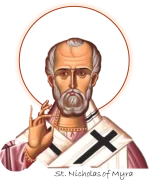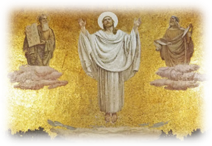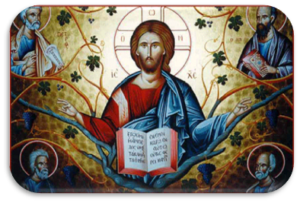
St. Nicholas Orthodox Church
A Western Antiochian Orthodox Parish in Spokane, Washington

A Western Antiochian Orthodox Parish in Spokane, Washington
 Published: Wednesday, August 06, 2025
Published: Wednesday, August 06, 2025
Contributing Author: Stephen Brannen
Today is the Feast of the Transfiguration — a holy day of devotion on our calendar–which commemorates the transfiguring of our Lord on the mountain top as a sign of his glory.
“Jesus Himself indeed shone as the sun,” says St. Augustine, “signifying that ‘He is the light which lighteth every man that cometh into the world.’ What this sun is to the eyes of the flesh, that is He to the eyes of the heart.” The light with which Jesus shone was not any created light, but his own uncreated light, his divine glory. We all have sinned and fallen short of that glory which was intended for us to share in from the beginning.
As St. Gregory Palamas says, “Through the fall our nature was stripped of divine illumination and resplendence. But the Logos of God had pity upon our disfigurement and in His compassion He took our nature upon Himself, and on [Mount] Tabor He manifested it to His elect disciples clothed once again most brilliantly. He shows what we once were and what we shall become through Him in the age to come, if we choose to live our present life as far as possible in accordance with His ways.”
The Transfiguration is both a revelation of the divinity of Christ and also a preview of the way our own human nature can be capable of sharing in the uncreated glory of God. When God took on our human nature in Christ, he transformed it—he transfigured it. “For the Son of God became man so that we might become God.” -St. Athanasius
May we all have a greater and greater vision of the radiant beauty of Christ shining in our hearts, “beholding the glory of the Lord with unveiled face, transformed into the same image from glory to glory, as by the Spirit of the Lord.”
Grace and Peace in our Lord Jesus Christ,
Stephen
 The Propers of today’s Feast tell of the Light of Jesus in the Transfiguration as beauty and truth. The awesome “lightnings” of this miracle are linked in the Introit to the amiableness of the Lord’s “dwellings,” also calling to mind St. Peter’s desire on the mount to dwell with the Lord and his Saints. The Collect prays that we may behold the King in beauty. St. Peter in the Epistle links the vision which he saw on the holy mountain to the truth which he now preaches. The Gradual and Alleluia speak of fairness (i.e. beauty) and brightness, as communicating goodness. The Gospel according to St. Luke recounts the event of the Transfiguration, with the Communion repeating the Lord’s instruction to tell of the Transfiguration vision only in reference also to the glory of the Resurrection. These truth and beauty of this Mass are as “riches and plenteousness” in the house of God, as the Offertory says.
The Propers of today’s Feast tell of the Light of Jesus in the Transfiguration as beauty and truth. The awesome “lightnings” of this miracle are linked in the Introit to the amiableness of the Lord’s “dwellings,” also calling to mind St. Peter’s desire on the mount to dwell with the Lord and his Saints. The Collect prays that we may behold the King in beauty. St. Peter in the Epistle links the vision which he saw on the holy mountain to the truth which he now preaches. The Gradual and Alleluia speak of fairness (i.e. beauty) and brightness, as communicating goodness. The Gospel according to St. Luke recounts the event of the Transfiguration, with the Communion repeating the Lord’s instruction to tell of the Transfiguration vision only in reference also to the glory of the Resurrection. These truth and beauty of this Mass are as “riches and plenteousness” in the house of God, as the Offertory says.Collect: O GOD, who on the mount didst reveal to chosen witnesses thine only-begotten Son wonderfully transfigured, in raiment white and glistening: mercifully grant that we, being delivered from the disquietude of this world, may be permitted to behold the King in his beauty; who with thee, O Father, and thee, O Holy Ghost, liveth and reigneth, one God, world without end. Amen.
Epistle: 2 Peter 1:13-18
Gradual. Ps. xlv. Thou art fairer than the children of men: full of grace are thy lips. My heart is indicting of a good matter: I speak of the things which I have made unto the King, my tongue is the pen of a ready writer.
Alleluia. Alleluia, alleluia. Wisdom vi. He is the brightness of the everlasting light, the unspotted mirror, and the image of his goodness. Alleluia.
Gospel: St. Luke 9:28-36
Offertory. Ps. cxii. Riches and plenteousness shall be in his house: and his righteousness endureth forever, alleluia.
Communion. St. Matthew xvii. Tell the vision which ye have seen to no man, until the Son of Man be risen again from the dead.
Hymn: Quicumque Christum Quæritis
All ye who seek for Jesus, raise
your eyes above, and upward gaze:
there may ye see the wondrous sign
of never-ending glory shine.
Behold him in celestial rays
who never knoweth end of days;
exalted, infinite, sublime;
older than heav’n or hell or time.
This is the Gentiles’ King and Lord;
the Prince by Judah’s race adored,
promised to Abraham of yore
and to his seed for evermore.
To him the prophets testify;
and that same witness from on high,
the Father seals by his decree:
‘Hear and believe my Son’, saith he.
All glory, Lord, to thee we pay,
transfigured on the mount today;
all glory as is ever meet,
to Father and to Paraclete.
Words: Aurelius Clemens Prudentius, ca. 4th Century; tr. ascr. William Chatterton Dix, 19th Century.